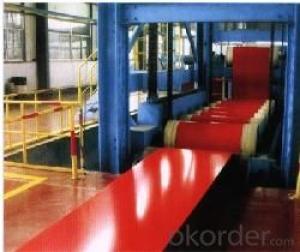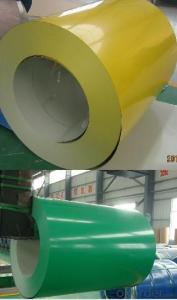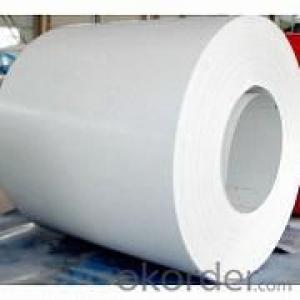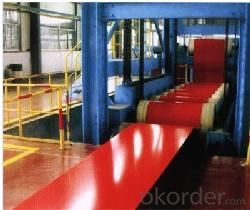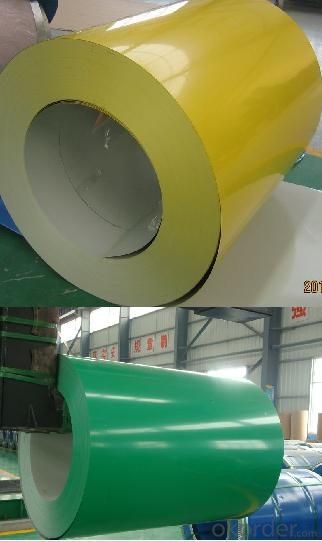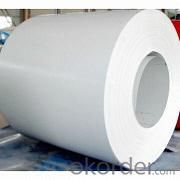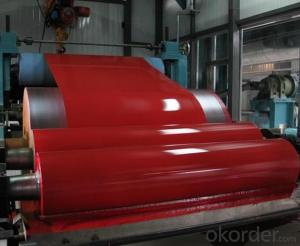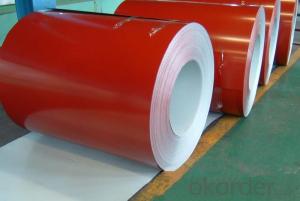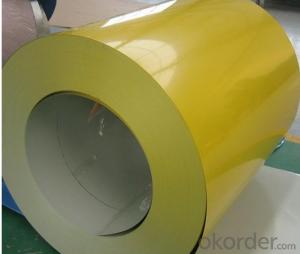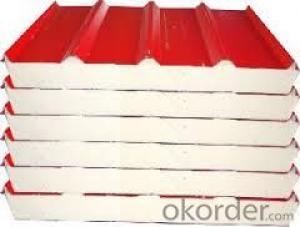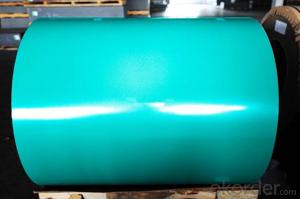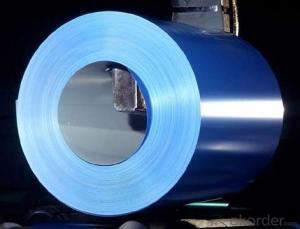Prepainted Steel Coil/PPGI/PPGI Color Coated Galvanized Steel Sheet With Excellent Price
- Loading Port:
- Shanghai
- Payment Terms:
- TT OR LC
- Min Order Qty:
- 50 m.t.
- Supply Capability:
- 10000 m.t./month
OKorder Service Pledge
OKorder Financial Service
You Might Also Like
Quick Details
| Standard: | AISI,ASTM,DIN,JIS | Grade: | steel | Thickness: | 0.17-1.5mm |
| Place of Origin: | China (Mainland) | Brand Name: | CNBM | Model Number: | SGCC Q195L, Q235, DX51D |
| Type: | Steel Coil | Technique: | Hot Rolled,hot dip | Surface Treatment: | Coated |
| Application: | Flange Plate | Special Use: | Steel | Width: | 600-1250mm |
| Length: | 2000-6000mm |
Specifications
1.reasonable price
2.reliable quality
3.fast shipment
4.huge production capacity
5.BV,SGS and TUV certificates
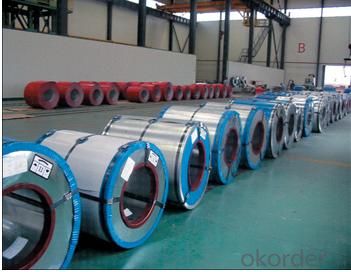
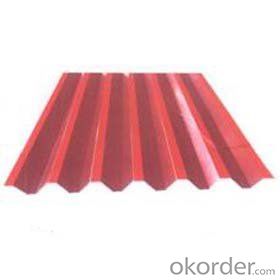
| Commodity | Prepanited steel coil |
| Grade | JIS G3302(SGCC), DX51D, EN10142, GB/T2518-2004, ASTM 653 |
| Standard | ASTM, AISI, DIN, GB |
| Types | Commercial / Drawing / Deep Drawing / Structural quality |
| Width | 500/650/726/820/914/1000/1200/1219/1220/1250mm |
| Thickness | 0.16-1.2mm (0.14-0.5mm is the most advantage thickness) |
| Type of coating | Galvanized |
| Zinc / PE coating | Z60-275g/m2 ,12-20μm(top)/7-10μm(bottom) |
| Surface | RAL System as per customers request |
| ID coil | 508mm |
| Coil weight | 4-6MT |
| Package | Properly packed for ocean freight exportation |
| Application | Industrial panels, roofing and siding for painting |
| Payment terms | 30%TT in advance+70% TT or irrevocable 100%L/C at sight |
| Delivery time | 25 days after recepit of 30% TT or L/C |
PACKING
4 eye bands and 4 circumferential bands in steel, galvanized metal fluted rings on inner and outer edges, galvanized metal & waterproof paper wall protection disk, galvanized metal & waterproof paper around circumference and bore protection
FAQ
We have organized several common questions for our clients,may help you sincerely:
1)How to guarantee the quality of the products?
We have established the international advanced quality management system,every link from raw material to final product we have strict quality test;We resolutely put an end to unqualified products flowing into the market. At the same time, we will provide necessary follow-up service assurance.
2)How long can we receive the product after purchase?
In the purchase of product within 20-25 days, we will arrange the factory delivery as soon as possible. The pacific time of receiving is related to the state and position of customers. Commonly 15 to 30 days can be served.
3)Do you have necessary certificate or inspection to make sure we can import smoothly?
Syringes are CE,FDA approved. And we supplied main nations in the world.
- Q: I'm getting new strings on my dad's old acoustic guitar so I can learn how to play it and I'm wondering if I should get nylon or steel strings. Are there any major differences between the two aside from the nylon strings being easier on your fingers? Like do the Nylon strings sound different?
- Listen to jwent You do NOT want to put steel strings on a nylon string guitar it will pull up the bridge, and top of the guitar, and break the plastic tuners that can't handle the extra tension You can put nylon a steel string guitar, but it won't sound like a classic guitar, because the steel string guitar has the extra bracing, to handle the tension of the steel strings, won't hurt anything, just won't sound as good If you want to soften the feel and sound of a steel string guitar, another option is silk n steel
- Q: What are the factors affecting the strength of steel coils?
- The factors affecting the strength of steel coils include the composition of the steel, the manufacturing process used, the temperature and time of heat treatment, the presence of impurities or defects, and the degree of deformation during processing.
- Q: What are the different methods of coil welding for steel coils?
- Steel coils can be welded using various methods, each with its own pros and cons. The following are some commonly used techniques: 1. Resistance Welding: In this method, an electric current is passed through the coils to generate heat, which fuses the ends together. It is a fast and efficient process that produces reliable welds. Industries requiring high-speed production often utilize resistance welding. 2. Arc Welding: This technique involves creating an electric arc between an electrode and the workpiece to create a weld. It can be further categorized into processes like shielded metal arc welding (SMAW), gas metal arc welding (GMAW), and flux-cored arc welding (FCAW). Arc welding offers good penetration and can be applied to a wide range of steel coils. 3. Laser Welding: Laser welding employs a high-powered laser beam to melt and join the ends of the coils. It provides precise control, high welding speeds, and minimal distortion. Industries such as automotive and electronics, which require precision and aesthetics, often rely on laser welding. 4. Induction Welding: This method involves using electromagnetic induction to heat the coils, which then melt and are pressed together to form a weld. It is suitable for thin-gauge steel coils and allows for precise control over the welding process. 5. High-Frequency Welding: High-frequency current is used to heat and weld the coils together in this technique. It is commonly used for pipes and tubes and offers high production rates and good weld quality. 6. Friction Welding: Friction welding creates a weld by generating heat through the rubbing of the coil ends. It is a fast and reliable method that produces strong joints. Industries requiring high-strength welds, such as automotive and aerospace, often employ friction welding. These are just a few of the many coil welding methods for steel coils. The choice of technique depends on factors like the steel type and thickness, required weld strength, production speed, and project requirements as a whole.
- Q: I want to purchase steel for construction purpose, What aspects should I keep in mind while deciding that which company should I contact for this?
- I okorder /
- Q: What is the thickness of a steel coil?
- The thickness of a steel coil can vary depending on the specific requirements and application. However, it is typically measured in millimeters or inches, ranging from a few tenths of a millimeter to several millimeters.
- Q: How are steel coils used in the manufacturing of automotive fenders?
- Steel coils are used in the manufacturing of automotive fenders by being shaped and formed into the desired fender design. The coils are cut and stamped into specific shapes, then undergo a series of bending, welding, and finishing processes to create the final fender product. The strength and durability of steel make it an ideal material for fenders, providing protection to the vehicle's wheels and body in case of collisions or impacts.
- Q: i know theres steel in it but what else?
- Chromium, nickel and molybdenum. Along with less carbon.
- Q: I'm in the process of buying a new car, and wondering if there are more benefits from Aluminum tire rims over Steel. Aluminum wheels cost more, but you'd think that steel would last longer. Are Aluminum wheels just for looks?
- Steel rims are stronger and will endure more abuse and curb scrapes. Aluminum rims are lighter and give the car a better ride due to less unsprung weight, but they require more maintenance and are easier damaged. I guess the final decision is up to you.
- Q: Cooling bed generally a part of the steel rolling mills
- In the USA, a steel cooling bed is called a run-out table. It consists of a series of steel rolls. Each roll may be individually driven by an electric motor. DC motors are often used with parallel armatures connected to a common armature voltage control speed control unit. The roll speed is controlled to match the speed of the incoming sheet of steel so that the steel does not slide or skid on the surface of the rolls. Field trim resistors help to assure that the speed and torque of rolls is matched. A centering mechanism may be used to keep the steel in the center of the table. Water may be sprayed from the top and bottom to aid cooling. After an initial run out table, the strip of steel may be cut on-the-fly into individual sheets which pass to another table that is running slightly faster to separate the sheets. Alternatively, the steel may be coiled at the end of the table.
- Q: What are the common coil processing equipment used in the industry?
- Some common coil processing equipment used in the industry include coil slitting machines, coil leveling machines, coil cutting machines, coil recoiling machines, and coil feeding systems. These machines are used to process coils of various materials, such as steel, aluminum, and copper, into desired sizes and shapes for further manufacturing processes.
Send your message to us
Prepainted Steel Coil/PPGI/PPGI Color Coated Galvanized Steel Sheet With Excellent Price
- Loading Port:
- Shanghai
- Payment Terms:
- TT OR LC
- Min Order Qty:
- 50 m.t.
- Supply Capability:
- 10000 m.t./month
OKorder Service Pledge
OKorder Financial Service
Similar products
Hot products
Hot Searches
Related keywords
